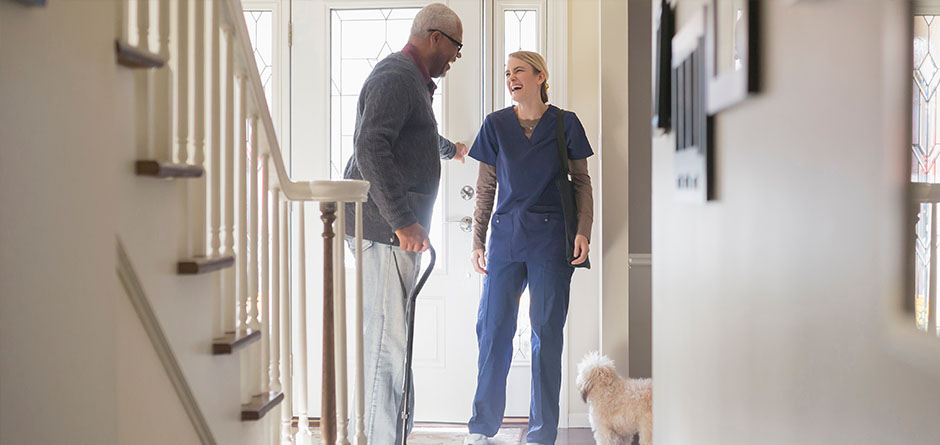What if there was a field of nursing that allowed you to form meaningful and long-lasting patient relationships, work outside of a healthcare facility, and that provided you with scheduling flexibility, excellent job security and competitive pay? It exists, and it’s called private duty nursing.
What is private duty nursing?
Private duty nurses (PDNs) provide long-term, comprehensive hourly nursing care in a patient’s home. They are either registered nurses (RNs) or licensed practical nurses (LPNs) who practice under the supervision of a RN clinical supervisor. “Private duty nursing offers SNF (Skilled Nursing Facility)-level care in the home,” says Jarrod DePriest, President of Maxim Healthcare Services.
And while this service benefits anyone with ongoing medical needs that can be addressed outside of a healthcare facility, most private duty nurses work with either pediatric or geriatric clients. “Our PDN patients are about 70 percent pediatric, 30 percent older adults,” says DePriest. “Often the pediatric patients are born premature and are dealing with a neurological or respiratory disorder. Our adult patients often have a chronic disease, such as ALS. For these patients, receiving care at home is the best quality option.”
Private duty nursing is often classified as home healthcare, but while other types of home-based care are short-term or non-medical, private duty nursing provides skilled medical care over a longer period of time. “The average length of stay in any given home for a private duty nurse is three-and-a-half years,” says DePriest.
The basics of a PDN shift: What do private duty nurses do?
A private duty nursing shift centers around one-on-one care tailored to a patient’s unique health challenges and needs. While there can be great variability in the specific tasks of a PDN, a typical shift includes the following responsibilities:
- Provide support with daily activities (e.g., personal hygiene, eating/diet, exercise, house chores and other tasks).
- Collaborate with other healthcare professionals and family members who care for the patient.
- Administer medications and help with wound care.
- Manage symptoms of patient’s chronic illness.
- Monitor patient’s overall medical status.
In addition, a private duty nurse is skilled at performing clinical interventions for patients with complex medical needs, including:
- Tracheostomy care
- Ventilator care
- GI tube feeding
- Catheter placement
- Injections
- Collecting samples for lab testing
One of the advantages of a private duty nursing job is the flexibility it offers — PDN jobs are often shift-based and can include day shifts, night shifts and per diem work. Shifts vary in length from eight to 24 hours.
Benefits of becoming a PDN
As a new and evolving job field, private nursing care offers many advantages and benefits compared to other types of nursing jobs including increased flexibility, independence and the opportunity to cultivate more meaningful relationships with patients.
- Flexibility. Compared to facility-based nurses, private duty nurses are less likely to work weekends and holidays, and are not subject to a hospital’s rigid shift schedule. It’s also feasible to work part-time as a PDN while furthering your education.
- Autonomy. As the primary caregiver for a patient, PDNs enjoy more autonomy in decision-making and can use their knowledge to transform a patient’s life. Also, private duty nursing provides you with an opportunity to serve the whole person, moving beyond their most basic medical needs.
- Meaningful patient relationships. PDNs are often able to see the impact of their care by working with patients over an extended period of time, creating more job satisfaction and a sense of accomplishment. In providing long-term, consistent care, PDNs naturally form meaningful relationships with patients and their family members.
- High demand. The U.S. Bureau of Labor Statistics predicts there will be a 7 percent growth in nursing jobs within the next decade, which accounts for roughly 222,000 nursing positions. Plus, with an aging population and more people turning to in-home care, private duty nursing will continue to grow, meaning more options and increased job security for PDNs. “Private duty nursing is expanding rapidly,” says DePriest.
- Competitive pay. The average annual salary for a private duty nurse is nearly $86,000, according to Glassdoor.com. Many PDN jobs pay hourly from $20-30/hour, with RNs earning slightly more per hour than LPNs.
How to become a PDN
- Get a nursing degree. You’ll need to earn your LPN certificate, associate’s degree or bachelor’s degree in nursing to become a private duty nurse.
- Pass the NCLEX exam. There may also be other licensing requirements specific to your state.
- Gain experience. Whether you gain clinical experience while you’re getting your degree or after you pass the NCLEX exam, it’s important to get familiar working with patients in a variety of settings.
- Earn additional certifications (optional). While there are no PDN-specific certifications required for this field, additional training and knowledge can be helpful.
*Note: Some employers, like Maxim, provide benefits such as tuition reimbursement with affiliated local universities, along with paid training and free annual courses. Maxim also offers a Novice Nurse Program that is designed to provide a year of hands-on learning and/or support to RNs, LPNs and LVNs with less than one year of experience in the patient care environment.
Maxim Healthcare Services is hiring private duty nurses at many of our offices throughout the country. Browse our current job openings.



